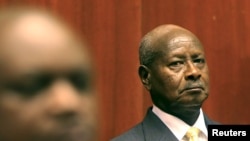Nomination of presidential candidates for Uganda’s 2016 general elections begins Tuesday. President Yoweri Museveni, who has ruled Uganda for 30 years, will be nominated by the ruling National Resistance Movement (NRM) for another term.
Also being nominated Tuesday for president is former Prime Minister Amama Mbabazi, who is running as an independent under auspices of The Democratic Alliance (TDA).
On Wednesday, long-time opposition leader Kizza Besigye will be nominated by his Forum for Democratic Change (FDC). Dr. Besigye and Mbabazi failed to agree to field a single candidate despite last-minute marathon meetings.
Medard Sseggona is a member of parliament and a supporter of former Prime Minister Mbabazi. He said the two sides had irreconcilable views.
“I must confess that we failed to agree. We had conceded to a number of proposals. Unfortunately our colleagues from the FDC felt that it would be right for them to field a presidential candidate. The coalition of about 9 political formations decided to continue with Honorable Amama Mbabazi as the presidential candidate and our colleagues in the Forum for Democratic Change decided to go it alone,” he said.
Sseggona said Mbabazi’s side had offered to concede the premiership and the first deputy prime minister positions to the FDC, but he said the FDC demanded to take the presidency.
“We felt that we have the best candidate and they felt they had the best candidate. And that’s the fundamental reason why the talks fell in that direction,” Sseggona said.
But supporters of Besigye believe he should have been the alliance’s candidate because he has the most popular appeal in the country.
Besigye himself told VOA in September he had reservations about the candidacy of Mr. Mbabazi.
“We had three reservations regarding the candidature of the Honorable Mbabazi. The first was that having being in government for the past 30 years, we did not think that he had demonstrable commitment to the central tenet that we in the opposition have been driving to make sure that we have change in governance,” he said.
Another reservation Besigye said he had about Mbabazi is that no one knows where the former prime minister stands on the key opposition demand for political and electoral reform in Uganda.
In addition, reports quoting anonymous FDC sources said Dr. Besigye supporters would have thought of him as a traitor if he had accepted the Prime Minister position.
Sseggona said the most likely challenger who can defeat President Museveni is Mbabazi, because Mbabazi is a newcomer to the opposition and brings the most recent information about President Museveni, his mindset and political machine.
“Nobody can tell about the level of support unless the campaigns have begun. But one thing I can give assurance about is that he (Mbabazi) comes with a wealth of experience, knowledge of the inside operation inside the NRM; he has been Prime Minister in this country; he has been Secretary General of the NRM,” Sseggona said.
Nomination of candidates for local government councils will begin November 16 and run to November 20.
According to the electoral commission, official campaigning for the 2016 presidential election will begin on November 9 and run through February 10, 2016.
The commission has promised to conduct a peaceful election and warned that “anyone who intends to disrupt any activity along the process shall be held responsible for the consequences.”




